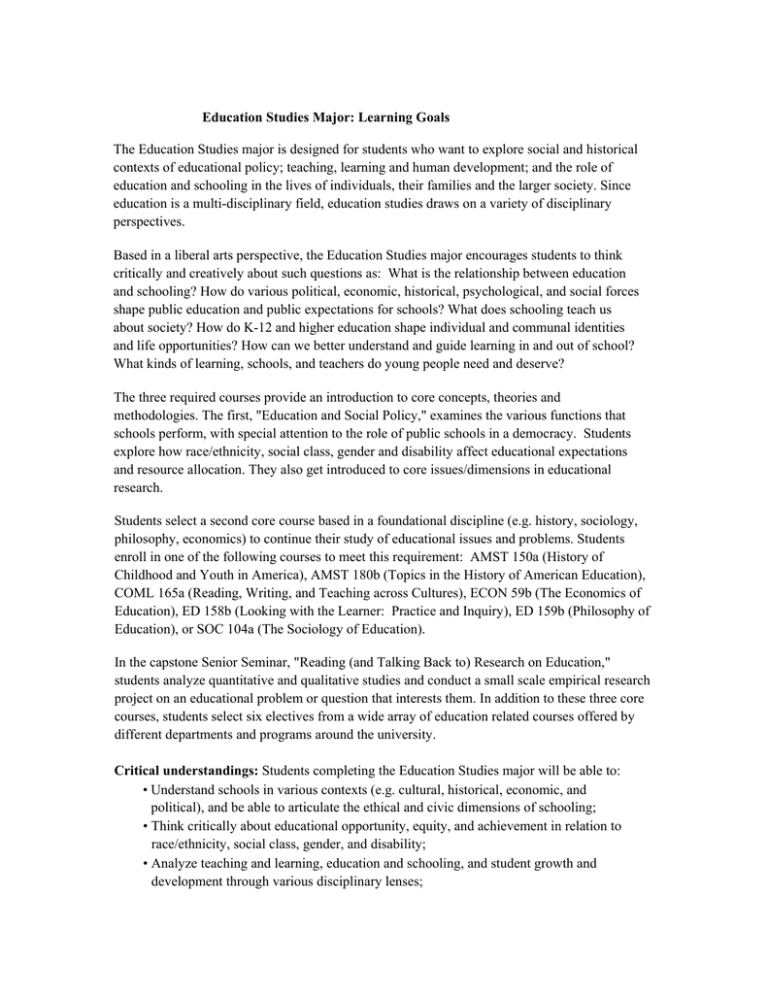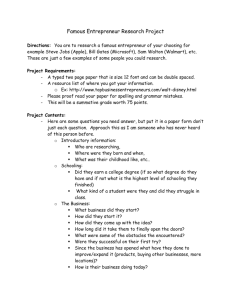Education Studies Major: Learning Goals
advertisement

Education Studies Major: Learning Goals The Education Studies major is designed for students who want to explore social and historical contexts of educational policy; teaching, learning and human development; and the role of education and schooling in the lives of individuals, their families and the larger society. Since education is a multi-disciplinary field, education studies draws on a variety of disciplinary perspectives. Based in a liberal arts perspective, the Education Studies major encourages students to think critically and creatively about such questions as: What is the relationship between education and schooling? How do various political, economic, historical, psychological, and social forces shape public education and public expectations for schools? What does schooling teach us about society? How do K-12 and higher education shape individual and communal identities and life opportunities? How can we better understand and guide learning in and out of school? What kinds of learning, schools, and teachers do young people need and deserve? The three required courses provide an introduction to core concepts, theories and methodologies. The first, "Education and Social Policy," examines the various functions that schools perform, with special attention to the role of public schools in a democracy. Students explore how race/ethnicity, social class, gender and disability affect educational expectations and resource allocation. They also get introduced to core issues/dimensions in educational research. Students select a second core course based in a foundational discipline (e.g. history, sociology, philosophy, economics) to continue their study of educational issues and problems. Students enroll in one of the following courses to meet this requirement: AMST 150a (History of Childhood and Youth in America), AMST 180b (Topics in the History of American Education), COML 165a (Reading, Writing, and Teaching across Cultures), ECON 59b (The Economics of Education), ED 158b (Looking with the Learner: Practice and Inquiry), ED 159b (Philosophy of Education), or SOC 104a (The Sociology of Education). In the capstone Senior Seminar, "Reading (and Talking Back to) Research on Education," students analyze quantitative and qualitative studies and conduct a small scale empirical research project on an educational problem or question that interests them. In addition to these three core courses, students select six electives from a wide array of education related courses offered by different departments and programs around the university. Critical understandings: Students completing the Education Studies major will be able to: • Understand schools in various contexts (e.g. cultural, historical, economic, and political), and be able to articulate the ethical and civic dimensions of schooling; • Think critically about educational opportunity, equity, and achievement in relation to race/ethnicity, social class, gender, and disability; • Analyze teaching and learning, education and schooling, and student growth and development through various disciplinary lenses; • Use educational research skills to investigate educational issues and challenges. Core Skills: The Education Studies major emphasizes core skills in analysis, critical thinking, research, and communication. Based on the critical understandings above, Education Studies majors will be prepared to: Think critically and write persuasively about the various functions schools perform in a community, with special attention to issues of equality and access in our democracy; Use research skills to assess the validity, paradigmatic claims and limits of empirical studies in education; Critically evaluate educational research, policy and practice, and develop policy recommendations. Social Justice: As a liberal arts university with a strong commitment to social justice, Brandeis has a responsibility to contribute to the improvement of education as a key building block of democracy. The Education Studies major examines the various functions schools perform in society, with special attention to the role of public schools in a democracy and the intended and unintended consequences of educational policies and practices on student access and achievement. The Education Studies major enables graduates to acquire and develop the knowledge, skills, and perspectives to examine and act on the ethical and civic dimensions of schooling. Upon Graduation: After graduation, a Brandeis Education Studies major will be well prepared to be a citizen in our democracy. S/he will also be prepared to pursue: Education policy, legislative, or non-profit work; Careers in education-related fields such as school psychology, higher education, informal education, museum education; Graduate study in preparation for teaching or a scholarly career in education. Please note: Education Studies is not a route towards teacher licensure.



